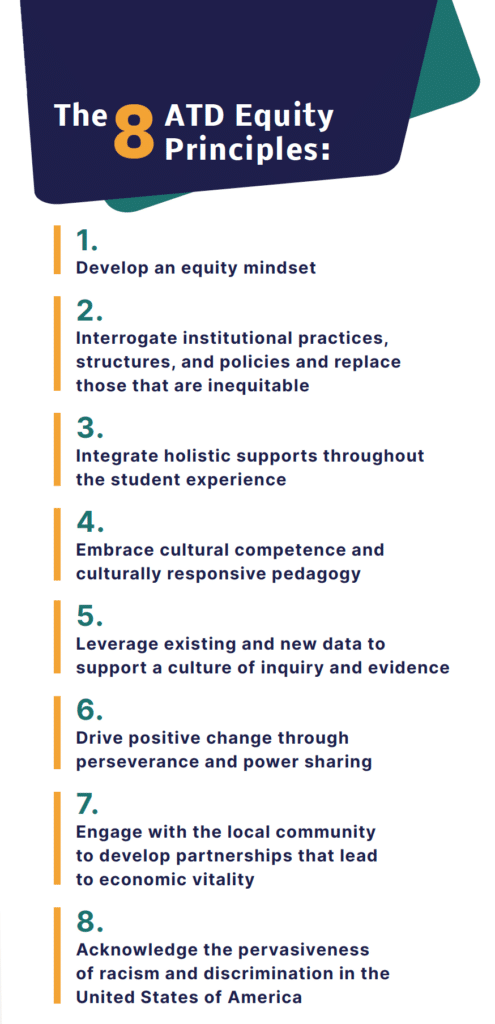Achieving the Dream’s newly released Equity Toolkit is a comprehensive resource designed to help colleges operationalize equity on their campuses, thereby improving student outcomes. It is based on eight principles of equity, which serve as guideposts for institutions that are committed to closing equity gaps in academic success rates and post-completion earning power for marginalized and minoritized students.
The connection between equity and many of the principles outlined in the guide is easily discerned upon first glance — for example, Principle 1: Develop an equity mindset; and Principle 2: Interrogate institutional practices, structures, and policies and replace those that are inequitable.
However, some other principles have a less obvious (though no less important) relationship to equity — one that requires us to dig a little deeper, to scratch through the surface to uncover the answer to the question: How does the upholding of this principle at an institution of higher education lead to increased equity for its students?
One such principle is number six in the guide: Drive positive change through perseverance and power sharing. An inclusive mode of governance, power sharing engages the collective wisdom and viewpoints of people in a broad range of roles in the process of decision-making.
One can develop a clearer understanding of the relevance of a college’s power sharing practices to its promotion of equity for students by examining an institution specifically called out in the toolkit for its exemplary work in this vein: Chattanooga State Community College (CSCC), which is located in Chattanooga, Tennessee, and serves approximately 7,500 students across a six-county service area.
Ensuring all voices are heard
Named an ATD Leader College of Distinction in 2023, Chattanooga State has been working with ATD since 2016. In recent years, the college has made concerted efforts to increase power sharing at all levels of the institution. Representatives of groups previously unrepresented at the “big table,” such as support and professional staff associations and plant operations employees, now have a voice in weekly cabinet meetings and other executive-level decision-making processes, where CSCC President Rebecca Ashford invites a diversity of perspectives.
The college has further broadened representation through employee resource groups, which have strengthened their presence — raising concerns, highlighting accomplishments, and providing professional development. In addition, a post-pandemic vote to continue holding campus-wide meetings in a virtual format speaks to the college’s commitment to eliminating barriers to participation in governance.
If anyone at Chattanooga State knows a thing or two about the college’s recent power sharing efforts, it is Dr. Quincy Jenkins, vice president of organizational culture and engagement. Dr. Jenkins was hired by CSCC in 2020 as its inaugural executive director of diversity, equity, and inclusion and has been in his current position, overseeing the college’s human resource functions, for approximately a year and a half.
He acknowledges that there is a practical benefit to having more comprehensive representation from various employee groups at decision-making meetings. “It’s easier to get buy-in when you have a sitting body that already has [diverse] voices present,” he says, especially when “decisions have to be made quite quickly.”
The importance of transparency
But the importance of broad representation runs far deeper than that for Dr. Jenkins; it’s about transparency. “I think it is critical to have more voices at the table … and for the college to see that the president is making a good faith effort to include as many people as possible, [as many] thoughtful voices as possible within the scope of the college’s activities,” he shares.
Dr. Jenkins adds that the appreciation for the transparency sticks with Chattanooga State employees even after their terms in the cabinet are over. “They can go back and say, ‘Hey, when something happens, the cabinet isn’t making all of these decisions in a dark vacuum-sealed room,’” he says with a smile. “There is a process involved, and so it really turns them into advocates for the college and lets them know, ‘Hey, you all can speak up as well.’ That’s the idea of shared power.”
According to Dr. Jenkins, Chattanooga State’s dedication to power sharing stems from its relatively new purpose, values, and mission statement. “We have a purpose and values [statement] that we created about two years ago that really emphasizes our shared systems of power and what that looks like in practice,” he says. “And so, we try to live by those values … [and] we try to be as transparent as we can.”
But how does power sharing — and all the transparency that comes with it — among the employees of Chattanooga State translate to equity for students?
—
“Equity work requires leaders who embrace an equity-centered as well as an equity-driven mindset and who lead by example. Leaders must be comfortable demonstrating vulnerability, embracing humility, creating space for individuals who are typically unseen or unheard…”
—
Leading by example
According to the Equity Toolkit, a foundation for advancing equity is having an institutional culture grounded in equity-mindedness with leaders who instill the value of lifting up others as part of the college environment. It starts with the raising of voices of colleagues as well as the admission that leadership doesn’t always have all the answers. In essence, part of getting to the point where students can have a sense of belonging is ensuring that employees feel valued.
Equity Principle 6 explains: “Equity work requires leaders who embrace an equity-centered as well as an equity-driven mindset and who lead by example. Leaders must be comfortable demonstrating vulnerability, embracing humility, creating space for individuals who are typically unseen or unheard, and intentionally cultivating a campus environment where students can develop a sense of belonging. They must also exert this same energy for their colleagues across campus at all levels.”
Dr. Jenkins describes how power sharing is, at its core, about giving others a voice and how it is the use of voice that leads to equity. This inclusive method of decision-making, he says, gives agency and influence, which then translate to an opportunity to verbalize needs and communicate inequities.
“To empower them to ask for help, to speak up for themselves, to practice self-advocacy, that lends to the idea of equity,” he asserts. “We all have to be judged fairly … but sometimes some people need more … to meet those needs, and that’s what we’re there for, to accommodate that. But we don’t know what we don’t know. And so, to empower people to speak up for themselves and say, “Hey, I actually need a little more assistance,’ I think it helps all of us.”
Practicing Humility
And as the Equity Toolkit points out, empowering others’ voices can only happen when leaders are capable of admitting that their views may not be the only valid ones in the room. Dr. Jenkins says that it is not only important for leadership to recognize that they are not omniscient, but they must become comfortable verbalizing it too. “It’s OK to say out loud, ‘I don’t know,’ sometimes, or ‘Let me ask,’” he states. “Where I sit, [it] is critical to be able to just kind of eat some humble pie … because people come to me for answers, and sometimes I don’t have them.”
According to Dr. Jenkins, the ability that he and other Chattanooga State leaders demonstrate in showing vulnerability in their positions is actually a strength for Chattanooga State. “Empowerment goes full circle,” he explains. How do we [achieve] it? Through a lens of diversity and equality and equity and accessibility. It’s all wrapped into one. But what it boils down to is how can I help you be the best version of you possible to help us as an institution? I think that power sharing just gives a lot of self-esteem and self-efficacy for all of us.”
Learn more about ATD’s Equity Toolkit: A Research-Based Guide to Operationalizing Equity.
Read about ATD’s equity-related services.
Not currently in ATD’s Network? Email [email protected] to schedule a consultation.
Want to learn more about becoming an ATD Leader College or Leader College of Distinction? Click here to learn more about ATD’s college recognitions.

